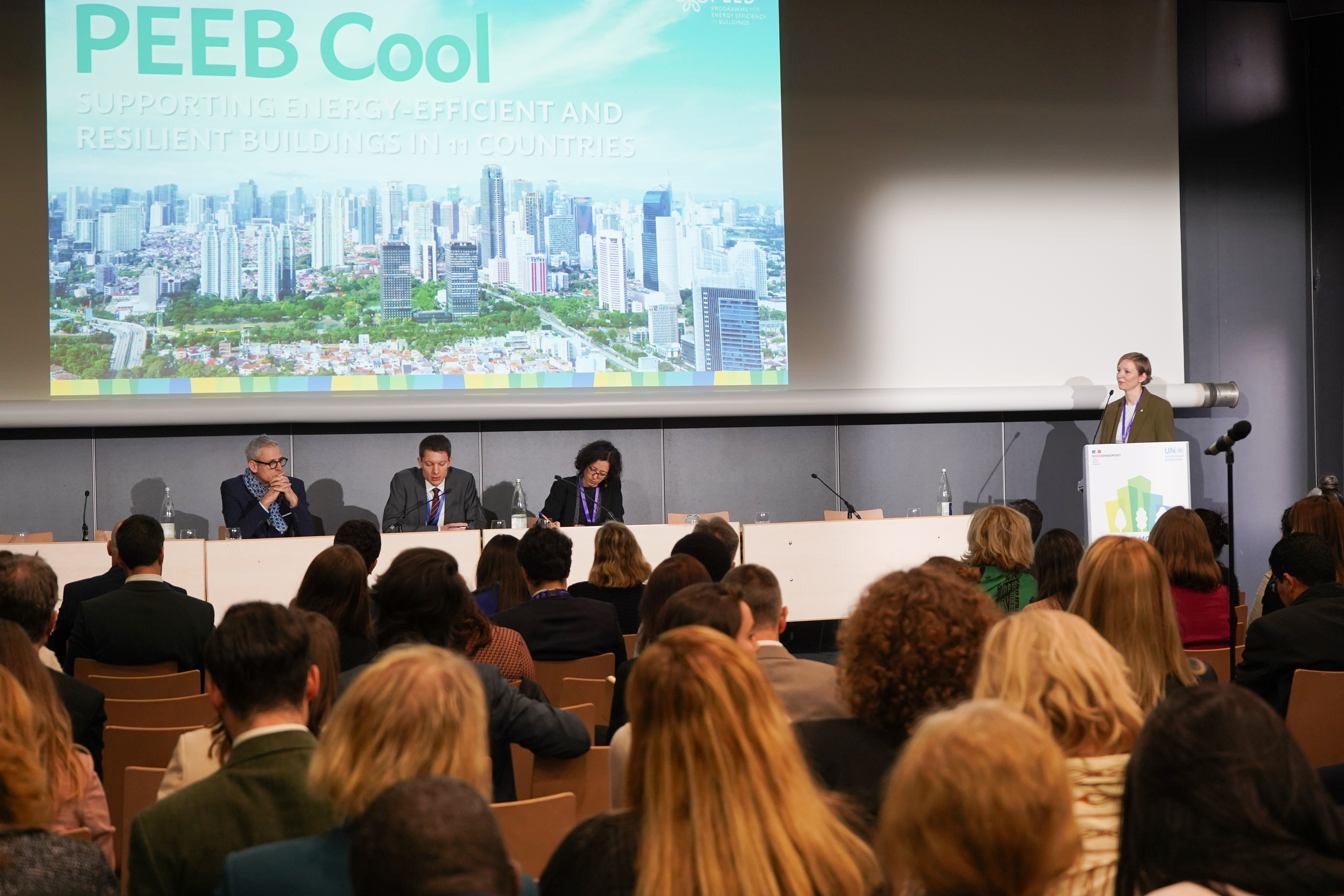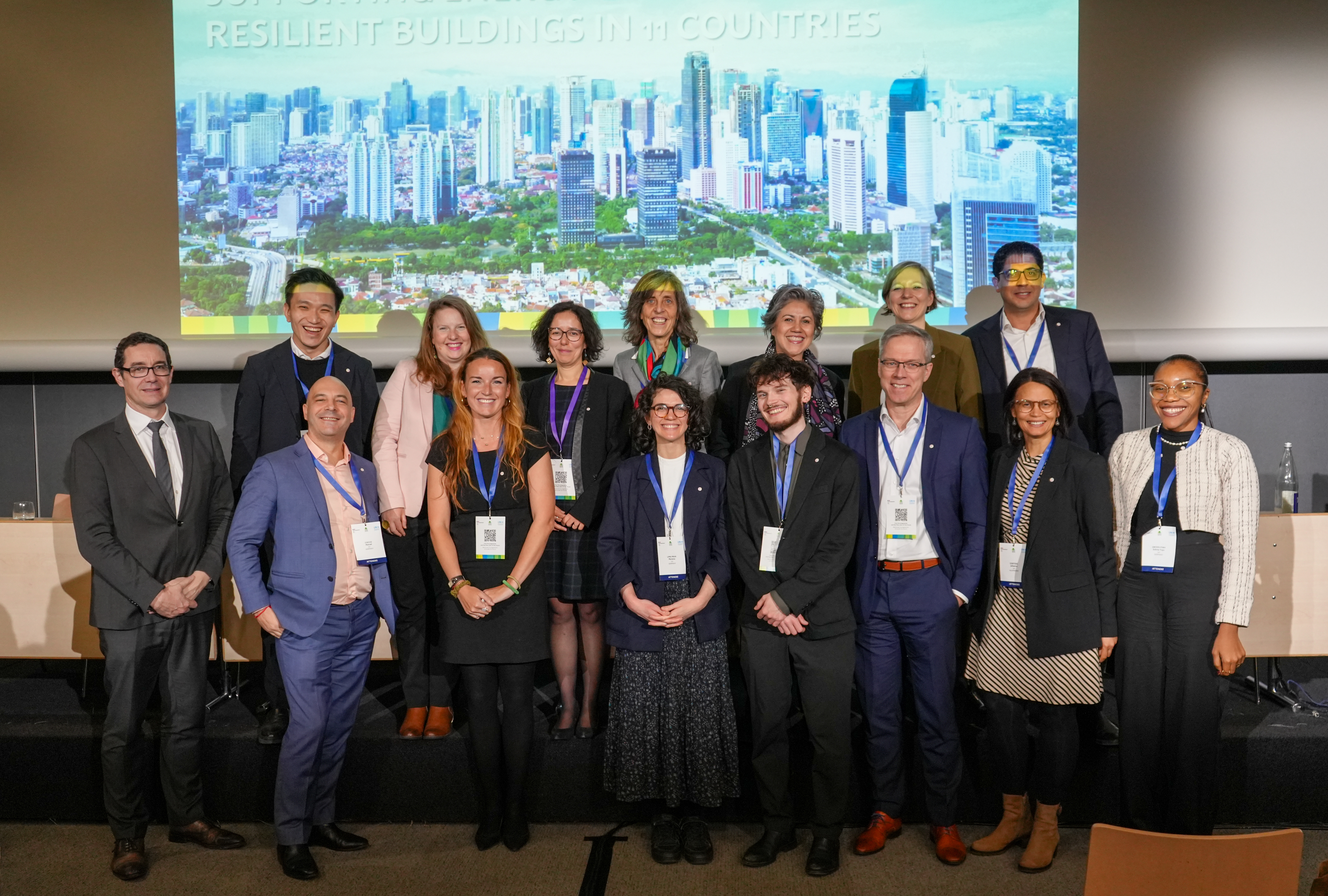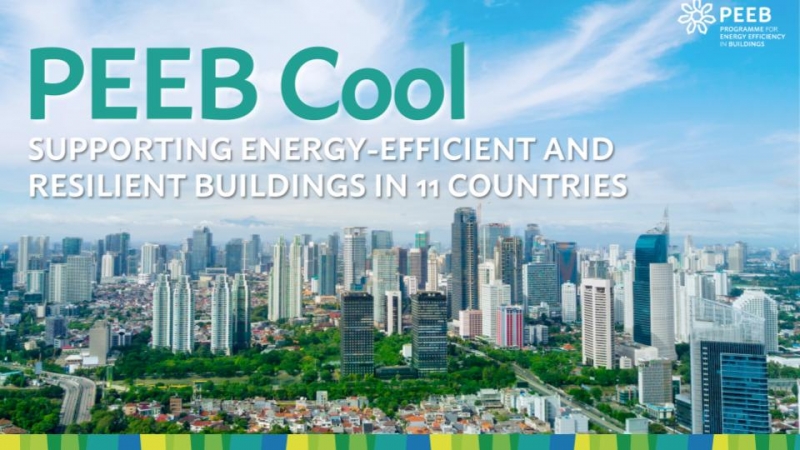
Yves-Laurent Sapoval (French Ministry for the Ecological Transition - MTE), Lutz Morgenstern (Federal Ministry of Economic Affairs and Climate Action of Germany - BMWK), Manelle Ait-Sahlia (French Development Bank - AFD), and Anna Zinecker (Programme for Energy Efficiency in Buildings - PEEB) launch the PEEB Cool programme at the Buildings and Climate Global Forum
- Albania, Argentina, Costa Rica, Djibouti, Indonesia, Mexico, Morocco, Nigeria, North Macedonia, Sri Lanka and Tunisia benefit from the initiative
- PEEB Cool has a finance window of 230.5 million EUR
- PEEB Cool supports countries in hot climates to improve energy efficiency in buildings and resilience to shocks such as extreme climate events and energy scarcity.
(7 March 2024) The PEEB Cool initiative has been presented today in Paris at the Buildings and Climate Global Forum. PEEB Cool will boost green buildings in 11 hot-climate countries with an initial financial window of 230.5 million EUR, marking a significant scale up of theProgramme for Energy Efficiency in Buildings (PEEB). The initiative will be jointly implemented by Agence Française de Développement (AFD) and the Deutsche Gesellschaft für Internationale Zusammenarbeit (GIZ).
In total, 11 countries in Africa, Asia, Eastern Europe and Latin America will benefit from PEEB Cool, which mission is to transform the buildings and construction sector by advancing resilient and energy-efficient building design, construction and operation.
Today, buildings and construction account for around 37 percent of energy-related CO2 emissions. This percentage will increase if it remains unaddressed, amongst other uses because as energy demand for space cooling is expected to triple by 2050. PEEB Cool will support partner countries to align their building sector with the goals of the Paris Agreement on climate change.
PEEB Cool will be operational this year and will count on an Investment Facility implemented by AFD to support the development of large-scale green building projects and an Enabling Facility implemented by GIZ to help countries improve strategies and regulations for resilient and efficient buildings through policy advice, capacity building and international awareness.
Along with the contribution from the GCF of around 220 million EUR, the Agence Française de Development (AFD) co-finances the Programme with 5 million EUR in project assistance grants. The FFEM contributes with an investment grant of 3 million EUR. The German Federal Ministry for Economic Affairs and Climate Action (BMWK) will contribute 2.5 million EUR as grants for policy support and international awareness. The concessional loans should leverage an estimated amount of 1.1 billion EUR of loans.
Key benefits for climate and people
Albania, Argentina, Costa Rica, Djibouti, Indonesia, Mexico, Morocco, Nigeria, North Macedonia, Tunisia, and Sri Lanka benefit from the Programme. It is estimated that around 1.13 million people will see their living conditions improved from buildings that are energy-efficient and adapted to the effects of rising temperatures.
PEEB Cool will primarily support the development of new constructions, but it will also address the refurbishment of existing buildings. It is expected that around 1.5 million tons CO2 equivalent will be reduced or avoided thanks to the impact of the programme.
CO2 emissions will be reduced at all phases of the construction and operation, and a strong emphasis will be put on reducing emissions from cooling through the development of bioclimatic buildings whilst also improving the users’ thermal comfort and security.
Together with cutting greenhouse gas emissions, PEEB Cool aims to increase buildings’ resilience to extreme climate events, but also to economic crises and energy scarcity. On the other hand, it is expected that PEEB Cool also helps create around 27,000 jobs, primarily in construction activities.
Manelle Ait-Sahlia, Deputy Head, Energy Division, Agence Française du Développement, said :
“Through its Investment Facility, PEEB Cool will support local stakeholders in implementing large-scale buildings projects and focus on improving living conditions of populations that are particularly vulnerable to extreme heat. PEEB Cool will be implemented in line with AFD’s ambitious energy transition strategy, and will be very mindful of closely following the GCF's and AFD’s guidelines in terms of Environmental and Social standards, including gender equality, to make sure PEEB Cool puts people’s wellbeing at the center of its activities”.
Yves-Laurent Sapoval, Ministerial Delegate for Sustainable Cities – Urban envoy, Ministry for the Ecological Transition, France, said:
“France has been at the forefront together with our partners from Germany to champion the much-needed energy efficiency of buildings worldwide. Since its founding in 2016, following COP21 and the launch of the GlobalABC, PEEB has grown thanks to the renewed commitment of the founding partners and the support from multilateral financial organisations such as the Green Climate Fund that we gratefully welcome. Today, the kick-off of the PEEB Cool initiative in the framework of the first-ever Buildings and Climate Global Forum in Paris is witnessing renewed momentum for greater international cooperation to put action on buildings and buildings at the top of the priorities of nations and financial institutions.”
Lutz Morgenstern, Head of Division at the Directorate of International Climate Action and Energy Transition, Federal Ministry for Economy Affairs and Climate Action, Germany, said:
“The challenge is clear, we need to combine climate action and sustainable development. On our urbanizing planet, there is a huge need for housing that is energy-efficient, comfortable and resilient. At the same time, we need to quickly bring down greenhouse gas emissions. At COP28, world leaders committed to doubling of energy efficiency improvements by 2030, thus placing the principle of energy efficiency as the "first fuel” at the core of policymaking, planning, and major investment decisions. PEEB is a key contribution for this often overlooked energy efficiency agenda. PEEB Cool is a real game changer for the implementation of this crucial initiative in terms of scale and scope, and we are happy to kick-start implementation of this new funding window now”.
Jerome Gastaud, Head of Energy and Climate, at the French Facility for Global Environment, said:
“The French Facility for Global Environment (FFEM) has supported the PEEB from its inception, and is very pleased to renew its contribution for the PEEB Cool initiative. FFEM launched a call for projects on Sustainable refrigeration and air-conditioning, with the aim of promoting synergies between the Paris Agreement and the Kigali Amendment to the Montreal Protocol. PEEB Cool is one of the winners of this call for projects and represents a unique opportunity to promote the increase of energy efficiency in buildings, especially in the cooling sector, in parallel of the phase down of HFCs. FFEM is strongly engaged to promote sustainable construction methods, and passive cooling solutions, and welcomes the kick-off of the PEEB Cool initiative during the first Buildings and Climate Global Forum.”

Members from the Global PEEB Cool team celebrate the launch of PEEB Cool. From the left to the right on the top row: Felix Ciosconara (GIZ Indonesia), Louise Virault (AFD Communications), Manelle Ait-Sahlia (AFD), Antje Wemhoener (head of PEEB Secretariat), Liliana Campos Arriaga (PEEB Mexico), Anna Zinecker (GIZ), Akram Hamza (GIZ Tunisia). From the left to the right, on the bottom: Manuel Cocco (GIZ Morocco), Juliette Jestin (AFD), Mariana Lima Maia (GIZ), Loe Guthmann (GIZ), Joern Deflize (GIZ), Johanna Coetzee (GIZ), Edima Yuyu Okodi-Iyah (GIZ Nigeria).
NOTES TO EDITORS
ABOUT PEEB
The Programme for Energy Efficiency in Buildings (PEEB) is transforming the buildings and construction sector through financing, policy support and capacity building with the vision to achieve a low-emissions and a climate-resilient built environment. PEEB was initiated in 2016, at COP22 by Germany and France and it is catalysed by the Global Alliance for Buildings and Construction (GlobalABC). PEEB taps into the expertise of its implementing agencies : Agence française de développement, Deutsche Gesellschaft für Internationale Zusammenarbeit (GIZ), and Agence de l’Environnement et de la Maîtrise de l’Energie (ADEME).
For more information, please visit the website or contact info@peeb.build
ABOUT AFD
Agence Française de Développement (AFD) implements France’s policy on international development and solidarity. Through its financing of NGOs and the public sector, as well as its research and publications, AFD supports and accelerates transitions towards a fairer, more resilient world. It also provides training in sustainable development (at AFD Campus) and other awareness-raising activities in France.
With our partners, we are building shared solutions with and for the people of the Global South. Our teams are at work on more than 3,250 projects in the field, in the French Overseas Departments and Territories, in 115 countries and in regions in crisis. We strive to protect global public goods – promoting a stable climate, biodiversity and peace, as well as gender equality, education and healthcare. In this way, we contribute to the commitment of France and the French people to achieve the Sustainable Development Goals (SDGs). Towards a world in common.
For more information, please visit the website
ABOUT FFEM
The French Facility for Global Environment (FFEM) supports innovative environmental projects in developing countries. It was created by the French government in 1994, following the first Earth Summit. FFEM has already supported more than 333 projects in more than 120 countries, two-thirds of which are in Africa. FFEM works in partnership with public, private, and civil-society stakeholders in both the South and the North, as well as with other donors and international organisations. The projects it finances generate local, environmental, social, and economic benefits. They not only help preserve biodiversity, climate, international waters, land, and the ozone layer, but also fight pollution. What makes FFEM special is that it focuses on pilot projects in order to learn from them and to disseminate their innovations on a broader scale.
For more information, please visit the website


 more
more